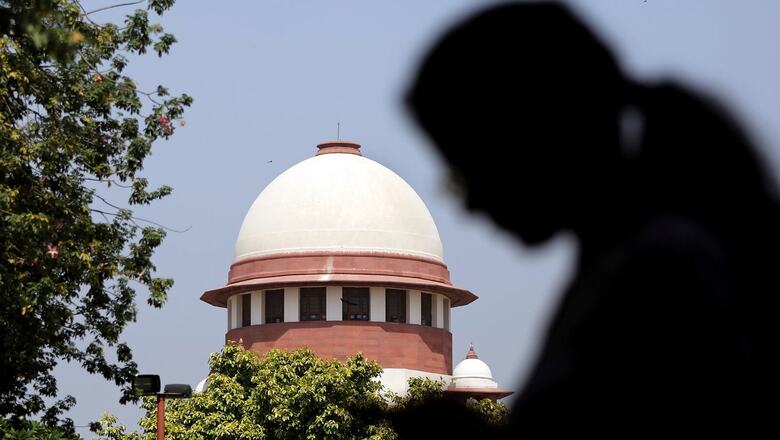
views
Sexual assault by husband can take the form of rape, the Supreme Court said in the first legal recognition of marital rape in the country on Thursday, while also ruling that unmarried women are entitled to seek abortion of pregnancies arising out of a consensual relationship at 20-24 weeks.
The top court’s ruling came a day after the world marked Safe Abortion Day as it was interpreting the Medical Termination of Pregnancy (MTP) Act and the related rules visa-vis the discrimination between married and unmarried women to allow abortion till 24 weeks of pregnancy.
“All women are entitled to safe and legal abortion… The interpretation of MTP has to reflect the societal realities. The 2021 Statement of Objects doesn’t differentiate between married and unmarried women,” a bench headed by Justice DY Chandrachud and comprising Justices AS Bopana and BV Nagrathna said.
“The distinction between married and unmarried woman for the purposes of the MTP Act is artificial and constitutionally unsustainable and it perpetuates the stereotype that only married women indulges in sexual activities,” the bench added, holding that the decision to abort is “her prerogative”.
More significantly, shedding light on the grey area in legal system, the Supreme Court also held that: “Under the MTP Act, rapes shall also include marital rape… Sexual assault by husbands can take a form of rape.”
Ruling that married women may also form a part of class of survivors, Justice Chandrachud said: “Rape means sexual intercourse without consent and intimate partner violence is a reality. In this case also, woman may get forcefully pregnant… Any pregnancy alleged to be caused by force is rape.”
The landmark judgment came on a petition filed by a 24-year-old seeking medical termination of her pregnancy. “Decision to carry pregnancy or terminate is part of woman’s bodily autonomy,” the court said, while also adding that every pregnant woman has the right to choose without permission. “Law shouldn’t decide beneficiaries of a statute based on narrow patriarchal stereotypes on what constitutes ‘permissible sex’,” said the court.
“Rights of reproductive autonomy, dignity and privacy give an unmarried woman the right of choice on similar footing as a married woman,” the bench added.
It, however, added that “… the meaning of rape must be understood to be marital rape solely for the purposes of MTP Act. This is important to save the woman from a forceful pregnancy.”
THE CASE
A bench of Justices DY Chandrachud, JB Pardiwala and AS Bopanna had on August 23 reserved its verdict on the issue of interpretation of the MTP Act, saying it would interpret the Act in such a manner that discrimination between married and unmarried women is removed to allow abortion till 24 weeks of pregnancy.
The bench had noted that the provisions in the MTP rules needed to be fine-tuned, and in the seven categories of women eligible to seek abortion till 24 weeks of pregnancy, it would add a category of women who suffer desertion, irrespective of marital status.
Additional Solicitor General Aishwarya Bhati, appearing for the Centre and assisting the court on the issue, had contended that there is no discrimination under the MTP (Amendment) Act, 2021, and categorisation has been provided in the relevant rules under the Act. She submitted that according to experts, categorisation has been done to curb the misuse of laws, including sex determination of the foetus.
The bench had then said that its judgment will be shaped in such a way that the provisions of Pre-Conception and Pre-Natal Diagnostic Techniques (PCPNDT) Act are not diluted. The court on Thursday reiterated the same. “Nothing in this judgment should be read to dilute the PCPNDT Act,” Justice Chandrachud said.
On July 21, the top court had expanded the scope of the MTP Act to include unmarried women and allowed a 25-year-old to abort her 24-week pregnancy arising out of a consensual relationship.
“A woman’s right to reproductive choice is an inseparable part of her personal liberty under Article 21 of the Constitution and she has a sacrosanct right to bodily integrity,” it had said. “Denying an unmarried woman the right to a safe abortion violates her personal autonomy and freedom. Live-in relationships have been recognized by this Court.”
Marital Rape
The Supreme Court had on September 16 sought the Centre’s response on pleas arising out of the Delhi High Court’s split verdict on the issue of criminalisation of marital rape.
The High Court had on May 11 delivered a split verdict, with one of the judges favouring striking down the exception in the law that grants protection to husbands from being prosecuted for non-consensual sexual intercourse with their wives and the other refusing to hold it unconstitutional.
However, both the judges had concurred with each other on granting the certificate of leave to appeal to the Supreme Court.
Justice Rajiv Shakdher, who headed the division bench of the High Court, had favoured striking down the marital rape exception and said it would be tragic if a married woman’s call for justice is not heard even after 162 years since the enactment of the Indian Penal Code (IPC).
Justice C Hari Shankar, who was part of the High Court’s division bench, had said the exception under the rape law is not unconstitutional and was based on an intelligible differentia having a rational nexus with the object of the exception as well as section 375 (rape) of the IPC itself.
The petitioners before the High Court had challenged the constitutionality of the marital rape exception under Section 375 IPC (rape) on the ground that it discriminated against married women who are sexually assaulted by their husbands. Under the exception given in section 375 of the IPC, sexual intercourse or sexual acts by a man with his wife, the wife not being minor, is not rape.
The petitions were filed by NGOs RIT Foundation, All India Democratic Women’s Association, and a man and woman seeking striking down of the exception granted to husbands under the Indian rape law.
Read all the Latest News India and Breaking News here

















Comments
0 comment